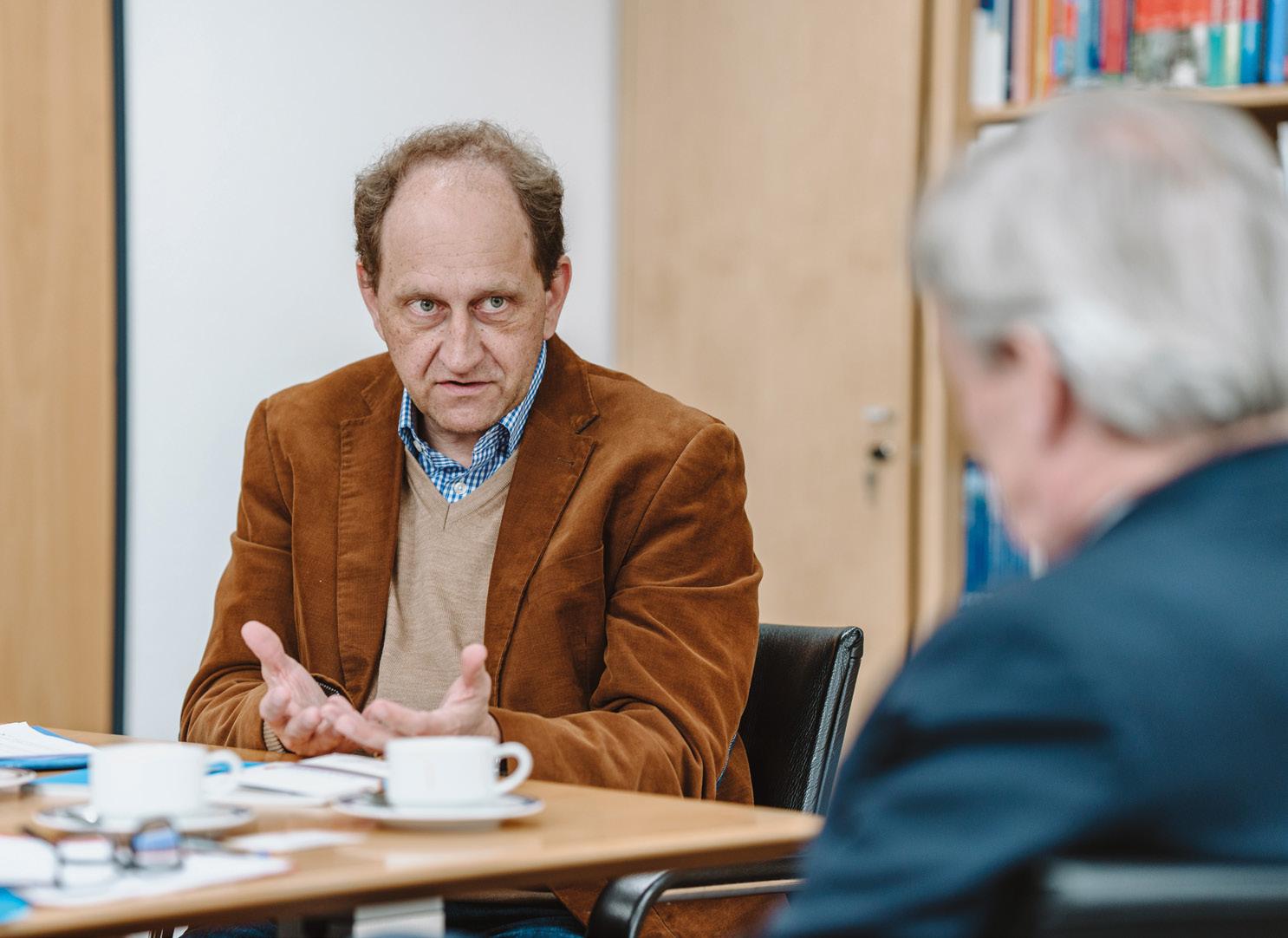
9 minute read
„Science diplomacy should be expanded“
from "foresee - recognising signs, devising solutions, shaping the future", Annual Report of H-BRS 2022
In science as in diplomacy, it is advantageous to foresee circumstances and challenges and keep the channels of communication open even under difficult situations. But there are limits. Alexander Graf Lambsdorff, deputy chair of the FDP in the German Bundestag and future German ambassador to Moscow, and University President Hartmut Ihne talk about where the lines run. They also discuss the role of science diplomacy, the gap between scientific knowledge and political practice, and various ways of supporting scientists at risk.
Ɏ Could the Russian invasion of Ukraine have been foreseen?
» Alexander Graf Lambsdorff: We should probably answer this question in the affirmative because in the Baltic States and Poland many people did foresee it. In German politics, only a few recognised how aggressively Russia had positioned itself towards Ukraine, and only some had taken note of what President Putin made public. Was it possible to foresee in what concrete form this would take place – such as with a major land war? Probably not. But that Russia intended to deny Ukraine its right to exist as a state and to take further measures – yes, it was foreseeable at the very latest after President Putin’s last essay.
» Hartmut Ihne: From the perspective of political science, I can state that there were sufficient indications. Apart from Putin’s publications, we could see how Russia dealt with contracts. In parallel, the idea that Russia could become a democracy had evaporated – with regard to autocratisation and the interventions in the legal, media and scientific sectors, for instance.
Ɏ You will take over the post of German Ambassador to Moscow this summer – with what expectations and what fears are you going there, Graf Lambsdorff?
» Lambsdorff: Relations between Germany and Russia will remain difficult for the time being. Some say that we should not talk to each other at all. I see that completely differently. Through my conversations with Russian officials, I hope to gain a sense of when something is developing in a positive direction. There is no light at the end of the tunnel at the moment, but I think you have to be present there to notice when something begins to change.
Ɏ What expectations do you have of the new ambassador in Moscow, Mr Ihne?
» Ihne: My wish is that the ambassador helps to keep the science channels open. Science only works in an atmosphere of freedom; in Russia it is put under pressure by many restrictions. For this reason, we have put our relations on hold in response to the war of aggression. A difficult balancing act remains. To what extent do we want to keep the channels of science open so that bright minds in the country remain scientifically connected to liberal democracies and we can continue to cooperate with them, even at the risk of inadvertently supporting parts of the system we oppose through the back door?
» Lambsdorff: I am quite happy to take up your wish. What continues to hold the door open are the networks that are the result of many years of cooperation, including scientific diplomacy. Many people in Russia were DAAD or Alexander von Humboldt Foundation scholarship holders, that is, they studied or conducted research in Germany. Their open-mindedness makes them less susceptible to state propaganda. I would like to use these fruits of scientific cooperation for my dialogues.
» Ihne: It seems to me that science is an essential partner for staying in dialogue with the rest of the world – or reinstating dialogue, making sensible policies and shaping our coexistence. At the moment, we as a scientific community are suffering an immense loss of scientific discourse due to the severance of relations – because Russia has excellent science. That is bitter to see.
Keeping the dialogue on science open is part of the field of science diplomacy. Does science diplomacy need to be strengthened and made more visible? Where do you see a need?
» Ihne: I think science diplomacy is an important channel that should be further developed. National borders are rather uninteresting for science. There is no national science, only national science systems – that is something else. As far as possible, we want to conduct science in such a way that it can also contribute to the development of society. But I see a certain reluctance in science itself to get involved politically. There is the world of research. In that world, some people feel self-sufficient with their own quality criteria, indices, impact factors and the like. Then there is the world of politics. There is no systematic bridge between the two worlds. We have been discussing “bridging the gap” between research and practice for a long time. In this case, practice also means political practice. This is the area where science needs to become more active. I find the approach of science diplomacy, which has been around for several years, exciting and important, but there is still much to be done.
» Lambsdorff: As I understand it, there are three levels of science diplomacy. One is diplomacy for science, that is, diplomacy creates the preconditions for certain forms of scientific cooperation through contact with government agencies in the host country. The second is science for diplomacy. This includes the diverse scientific relationships, such as alumni networks. Even where circumstances are politically difficult at the moment, scientific cooperation can perhaps continue and people remain in dialogue with one other. In diplomacy we call this Track 2, that is, Track 2 diplomacy. And as a third aspect, there is science in diplomacy. New insights are constantly arising from science for how states deal with each other. For example, how do we regulate the use of AI in automated weapons? That is a highly scientific question ...
» Ihne: … and a highly ethical question …
» Lambsdorff: Yes, highly ethical. We need to be able to deal with the results of scientific work through diplomacy. Science diplomacy is a large and fascinating field.
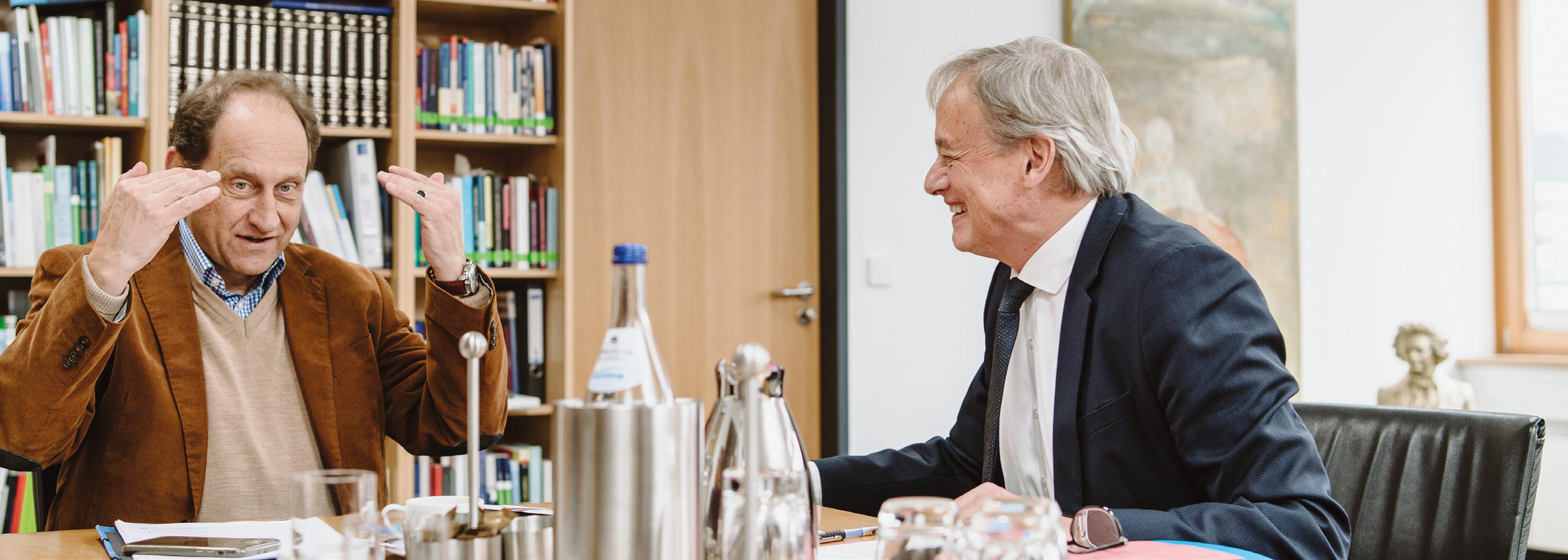
» Ihne: Nevertheless, for our mutual benefit, one must be aware of some points, such as the speeds and agendas one works with. Science focuses on the long term. Although some people directly address a current issue, there still remains a mismatch between the rapidly changing political reality and the long-term nature of scientific work. Researchers want to work methodically and cleanly, argue logically and be able to prove results empirically. This results in other time dimensions that need to be taken into account if we want to make science useful for political, meaning also diplomatic, processes.
Ɏ What example comes to mind for the positive impact of science diplomacy?
» Lambsdorff: A successful example –although the timing and intensity can be debated – is climate science. Its findings have translated into climate diplomacy. The Paris Accords would never have come about without the previous decades of findings in the field of climate science.
» Ihne: Nevertheless, the gap remains, especially when it comes to the climate. It is easy to see what causes this gap. Several decades have passed since the scientific realisation that climate change is humanmade. But when the evidence was available and scientists began sending out warning signals, very little happened in politics at first and only selectively, not in the totality. In science, the idea prevailed that after clear evidence was brought forward, politics, the world community had to act accordingly. But that is not the way it works because there are two concepts of truth. The scientific concept of truth is based on logical argumentation and empirical verifiability. In politics it is different. For a statement to have validity in the sense of effect, it requires majority backing – at least in democratic systems. Or vice versa – as long as a statement does not have a political majority backing, it cannot achieve any tangible political effect.
» Lambsdorff: Exactly. Impact is all about power, and in democratic systems power stems from the majority. So not only does it usually take a long time for an insight to reach the wider public, but it also takes a great amount of time and persuasion to win over a majority. The work of gaining knowledge and the work of persuasion – in politics these are two different phases.
Ɏ We are currently experiencing push-back against democracy and majority principles worldwide. How can politics and politicallyindependent science stop this trend?
» Lambsdorff: The trend is worrying, but the honest answer is that we do not know how to stop it. In the nineties, there was a movement towards more democracy, more freedom. Today, we are seeing a decline in academic freedom, in freedom of the press, in political and entrepreneurial freedom. And this even in Poland, in Hungary – in other words right on our front doorstep within the European Union! It is true that pressure to stop the dismantling of basic democratic rights is increasing. But that is often not enough because it is not possible to exert sufficient social influence inside these countries. In Germany, we have a very respected instrument in the form of our political foundations, and this exerts positive influences on many processes. But this instrument can only be successful in a supportive way, it cannot reverse a dismantling of democracy wanted by the leadership of a country.
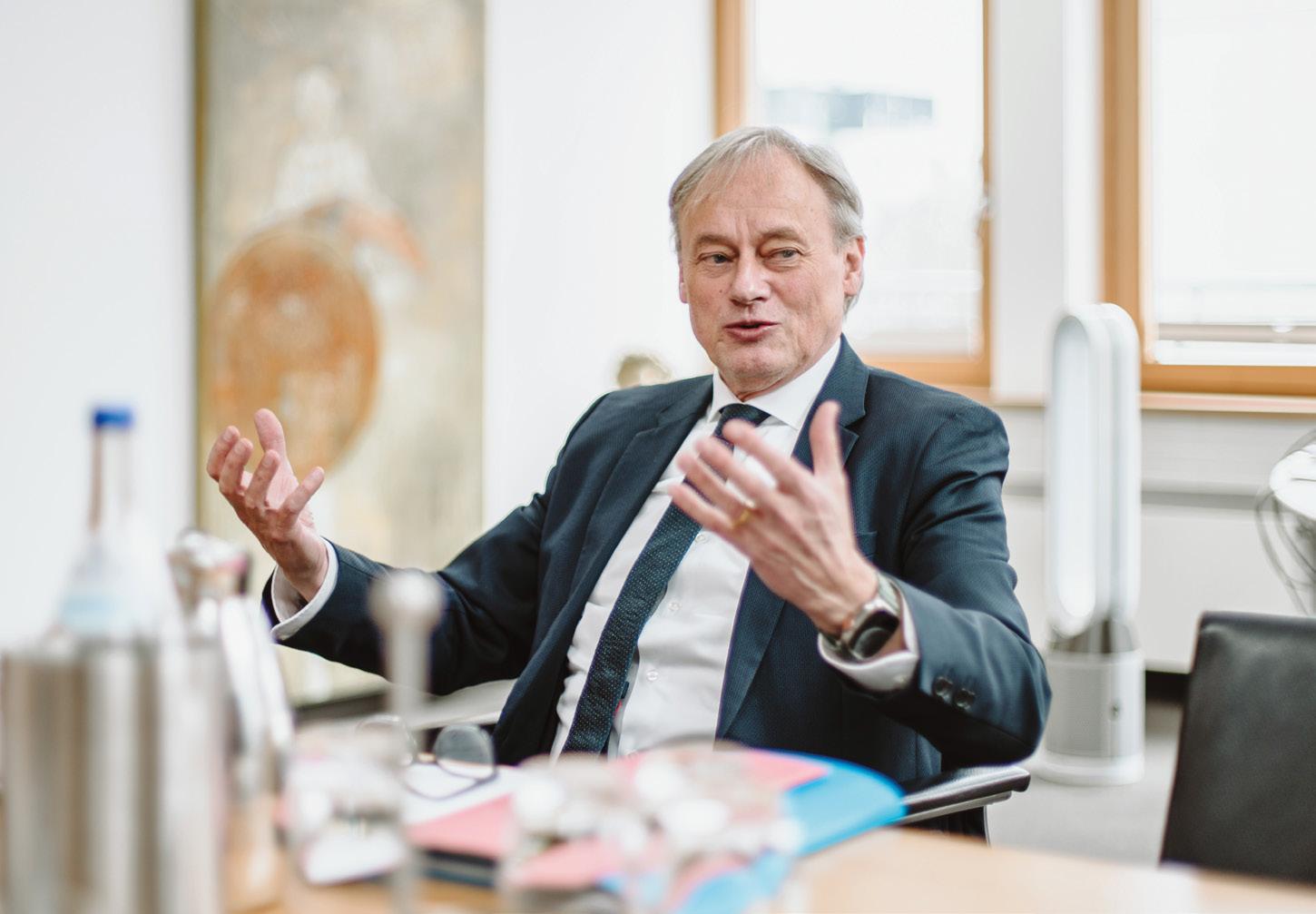
Ɏ The situation has also deteriorated with regard to academic freedom. Scientists are persecuted or even arrested as opponents of the regime. Organisations such as Scholars at Risk or the Alexander von Humboldt Foundation’s Philipp Schwartz Initiative assist those being persecuted. What role do individual universities play?
» Ihne: In addition to the organisations mentioned, flexible individual procedures are important. An example – scientists from Chernihiv University were with us as guests when Russia started the war. We extended their contracts quickly with no red tape and ensured that they could stay until further notice, until the war is over. In this respect, the bilateral relations between universities contribute significantly to providing researchers with a space of freedom. If that didn’t exist, no one would speak up anymore. Standing up for each other is a vital part of solidarity in the science system.
» Lambsdorff: The foundation of successful science is freedom. That is why the concept of academic freedom exists. Viktor Orban, for instance, expelled the Central European University from Budapest because it was too free, too critical for him. The initiatives you mentioned are central safety-net systems. Sometimes endangered critical voices – scientists, artists, journalists, or politicians only leave the country shortly before their arrest. They are then left with nothing. That is why we should support organisations that stand up for the respective academic and artistic minds in these countries as much as possible.
ɎWhere do you see the strengths of the universities of applied sciences in this respect?
» Ihne: The large, top-tier universities of excellence often have little interest in cooperating with universities that do not appear in the rankings. But these cooperation projects also support scientists and thus strengthen the instrument of German science diplomacy. Universities of applied sciences are, among other strong points, ideal partners in countries whose societies are in the process of development or democratisation. I am always surprised to see that far too few of the 268 universities in the German Rectors’ Conference are prepared to seek cooperation in sub-Saharan Africa, for instance, where, in individual cases, they could help to spur innovation in entire regions. So, while some universities are primarily looking for top-tier research partners, universities of applied sciences place particular emphasis on creating an impact on society. Science must always have both: good foundations and good impact in practice. That is my aim in leading this university of applied sciences. I want to experience the added value of science. Who helps our SMEs to find and implement new business models in the ecological transformation, for instance? Or to venture into new markets? With the German Agency for Transfer and Innovation (DATI), we will hopefully in the future have an institution to promote our research on social impact.
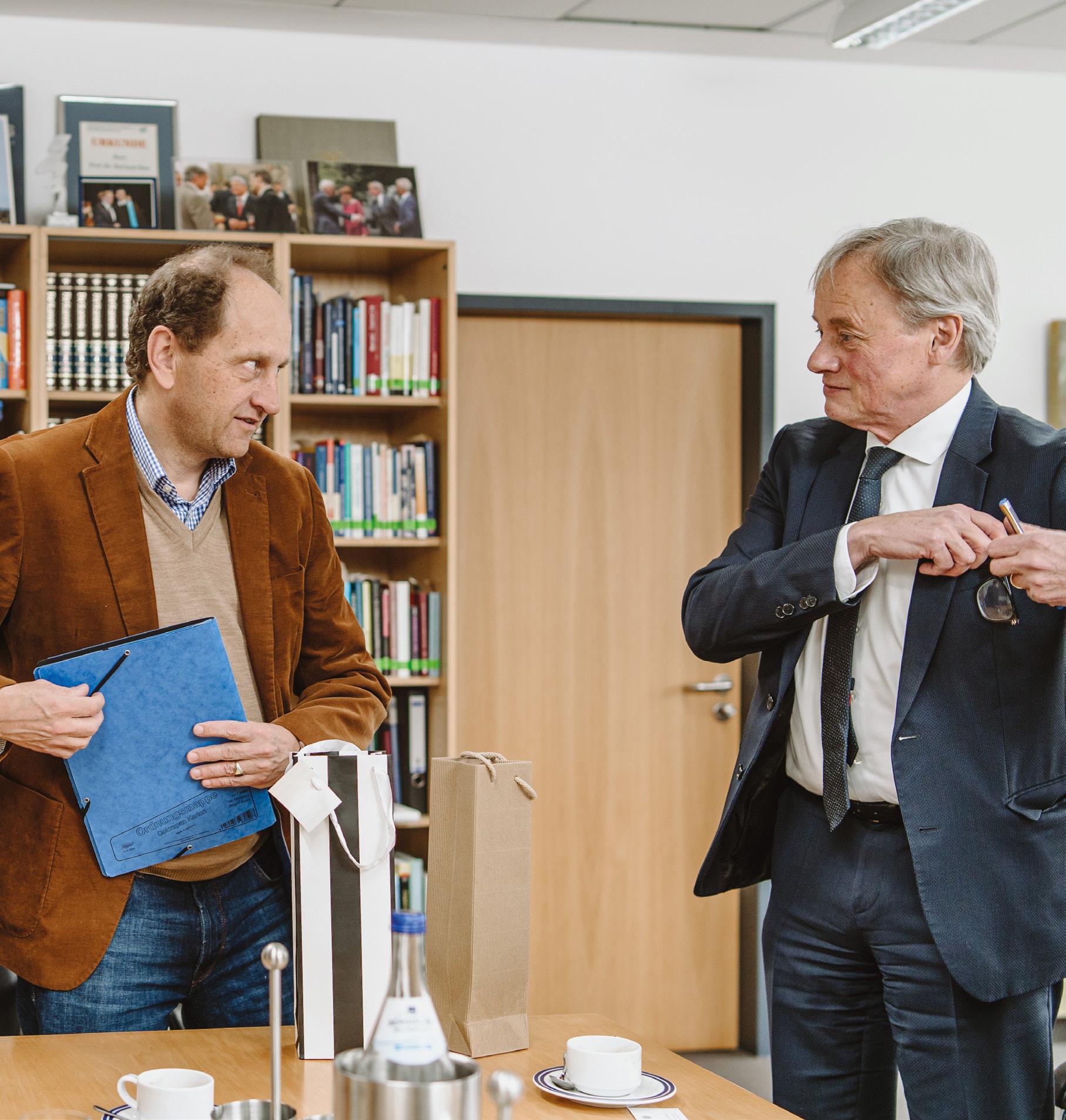
Ɏ“Bonn im Herzen – Die Welt im Blick” (“Bonn our heart – the world in view”) is the motto of your website, Graf Lambsdorff. Is being rooted locally particularly important in view of advancing globalisation?
» Lambsdorff: I feel attached to home and at home in Bonn. A walk along the Rhine, the view of the Siebengebirge, the Hofgarten, the cafés in the city – these are all part of an emotionally important connection for me, and at the same time I travel internationally for work and would not want to give that up. If you look a little closer, this seems to be true for many people. On the one hand, we live globalisation with flexibility, relocation, longdistance relationships, and on the other hand, we have a longing for the regional and for home.
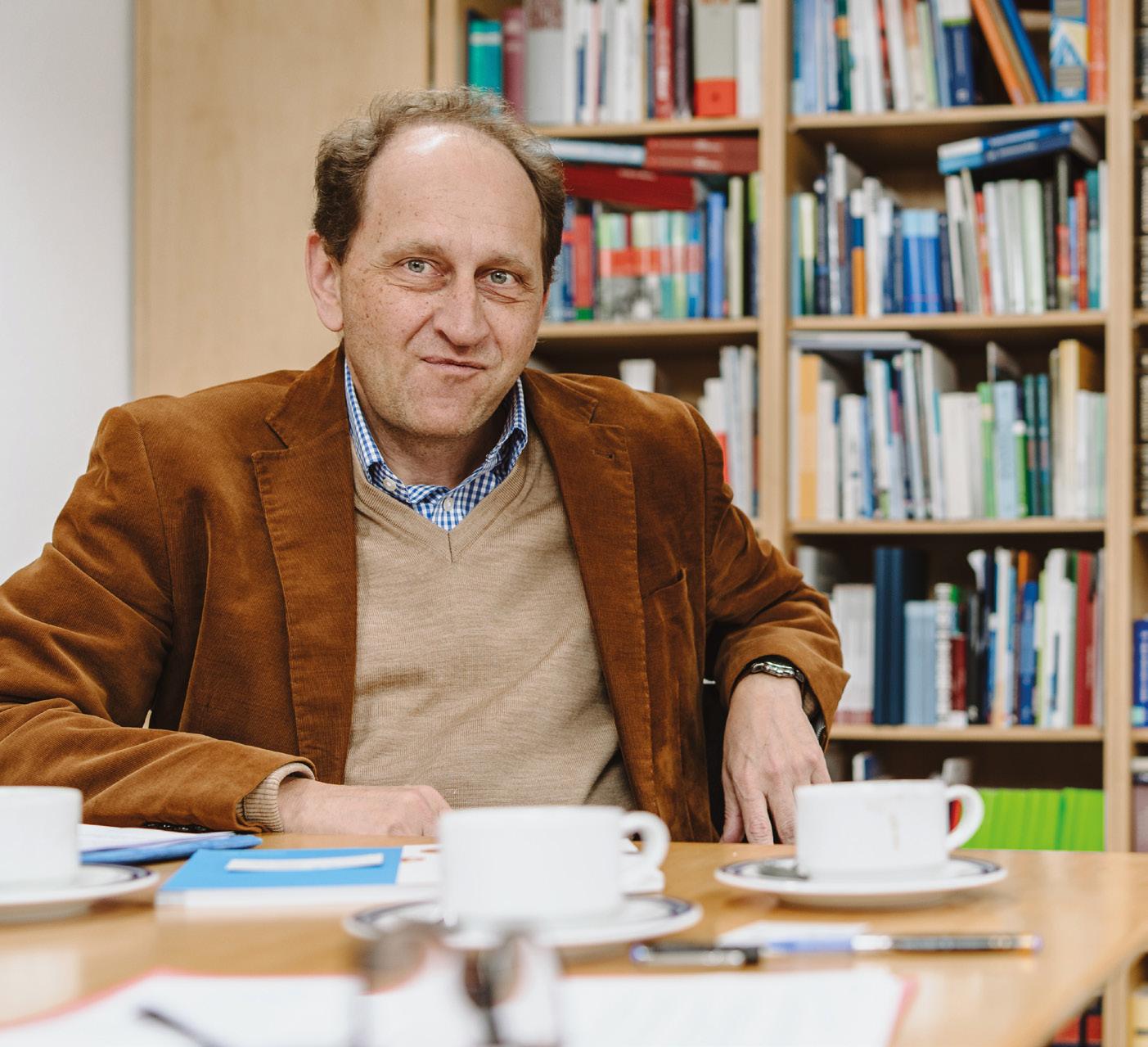
» Ihne: What exactly constitutes globalisation? That is an important question. Real life is rooted regionally everywhere in the world: productivity, relationships and the meaning of life originate there. And if you work in the region, you also work for the whole. The regions are the true core of globalism. And the global interacting network of regions – that is the meaning of globalisation.
Alexander Graf Lambsdorff has been a member of the Bundestag for the FDP representing Bonn since 2017. His responsibilities include foreign, security, European and development policy. He was previously a member of the European Parliament from 2004 to 2017, and its Vice President from 2014 to 2017. As early as 1995, Lambsdorff received training as a diplomat and in 1997/1998 was a member of the planning committee in the German Federal Foreign Office under the then FDP Foreign Minister Klaus Kinkel. He gained experience in the German Embassy in Washington from 2000 to 2003. From summer 2023, Lambsdorff will represent Germany in Moscow as ambassador.










